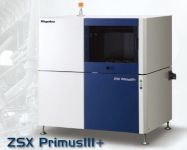Tube above optics for superior reliability
ZSX Primus III+ features an innovative optics-above configuration. Never again worry about a contaminated beam path or down time due to sample chamber maintenance. The optics-above geometry eliminates cleaning worries and increases up time.
High precision sample positioning
The high precision positioning of the sample ensures that the distance between the sample surface and X-ray tube is kept constant. This is important for applications that require high precision, such as the analysis of alloys. ZSX Primus III+ performs high-precision analysis using a unique optical configuration designed to minimize errors caused by non-flat surfaces in samples such as fused beads and pressed pellets
SQX fundamental parameters with EZ-scan software
EZ-scan allows users to analyze unknown samples without any prior setup. This time saving feature requires only a few clicks of the mouse and a sample name to be entered. Combined with SQX fundamental parameters software, it provides the most accurate and rapid XRF results possible. SQX is capable of automatically correcting for all matrix effects, including line overlaps. SQX can also correct for secondary excitation effect by photoelectrons (light and ultra-light elements), varying atmospheres, impurities and different sample sizes. Increased accuracy is achieved using matching library and perfect scan analysis programs.
Features
- Analysis of elements from O to U
- Tube above optics minimizes contamination issues
- Small footprint uses less valuable lab space
- High precision sample positioning
- Special optics reduce errors caused by curved sample surfaces
- Software tools for statistical process control (SPC)
- Evacuation and vacuum leak rates can be optimized for throughput









 Print
Print Sent by email
Sent by email



